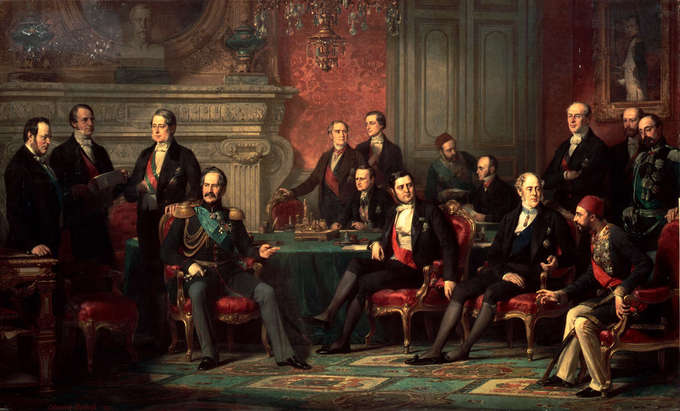
There are situations in business and life where two powerful players have good reasons for vital co-existence and even fruitful collaboration where at the same time they’d also find valid reasons for their mutual destruction. It’s at the brink of that fine line where talented negotiators can define the destiny of a whole company or a country for a very long time.
A recent read of Henry Kissinger’s book “Diplomacy” let me recapture my already lost knowledge from school history lessons. And I found something valuable in it for my own business life. An event more than 200 years ago contains solid old-school sales & negotiation advice that I want to dig up here.
In his book, Kissinger beautifully explains how the five European superpowers (Great Britain, France, Prussia, Austria, Russia) of that time, closed a peace treaty in the year 1814 after the Napoleonic wars came to an end.
It was one of the rare opportunities in history that only occur after a major war or dispute with a lot of damage for all sides comes to an end. In such a situation all the involved parties have the chance to press the “reset” button and set a new tone for the future.
The victors of the Napoleonic wars and defeated France met at the Congress of Vienna during Napoleon’s first exile and later escape from Elba. Their goal was to rebuild the international order and create enduring peace on the European continent.
Every country’s monarch sent their best negotiator to Vienna: Prince von Metternich for Austria, Prince von Hardenberg for Prussia, Talleyrand sent by the newly restored Louis XVIII of France, the Russian Tsar Alexander l who represented himself, and Lord Castlereagh on Great Britain’s behalf.
The most fascinating result of the Vienna Congress was that in its aftermath Europe entered into the longest period of peace it had ever known. The relatively stable peace lasted for about 40 years without any major interruption (!) and then after the short Crimean War of 1854 for another 60 years (ending with World War I). Given the prior (and sadly following) history of continuing wars and conflicts on the continent that was a significant achievement.
The negotiators managed to design an equilibrium that was so resilient that it could “only be overthrown by an effort of a magnitude too difficult to mount”.
But how did they do this? What strategy led to success?
It turned out that the negotiation talent of Prince von Metternich from Austria was playing a large role. He was famous for his realistic worldview and common sense approach:
“Little given to abstract ideas, we accept things as they are and we attempt to the maximum of our ability to protect ourselves against delusion about realities. […] with phrases which on close examination dissolve into thin air, such as ‘the defense of civilization’, nothing tangible can be achieved.”
Metternich was absolutely aware of the fact that due to the geographical position, Austria was at the risk of being attacked from the West (France) and the East (Russia). Another war, led by expansionist interests, would’ve brought the country to the brink of its existence, so there was a necessity for Austria to create a stable peace for a very long time.
In parallel, all negotiators were facing the risk of domestic upheaval in their home countries. People with nationalistic or republican ideas could lobby against any peace treaty and engage in efforts towards its violation and ultimate breakup. It was necessary that every negotiator could go back to their country and claim a huge win.
In order to manage those risks Metternich focused on a few powerful strategic moves during the negotiations:
- He and his fellow negotiators united behind a common goal with something like: “We want to create peace and a stable international order for as long as possible.”
- He went in with very few claims for his own country which gave him the leverage to limit the claims of others. “It is more important to eliminate the claims of others than to press our own […] we will obtain much in proportion as we ask little.” With that, he achieved to keep the expansionist dreams of the Russian Tsar in balance and could also claim huge negotiation success at home.
- He created unity where there was none before by focusing on common values.
Metternich’s calculation was that after the disastrous outcome of the French revolution which led to Napoleon the Monarchy, combined with some modern elements was the most stable form of government and very hard to overcome. So he developed a vision for a united Europe based on the alliance of the strong monarchies.
All four countries’ leaders were facing the same danger by the competing ideologies of nationalists and republicans. So he named and labeled the common values of the four powers and convinced the other negotiators that it is in their very own interest to protect them – by keeping the peace and acting in unity. That was brilliant. - He consulted the mighty Russian Tsar more often than necessary and gave him the feeling that he was the most important person in the room. By keeping him very close, Metternich let him believe that he was the originator of the idea and that the deal was made at his mercy. Instead of treating him like a mighty opponent Metternich used the Tsar’s inflated ego for a good purpose and built rapport with him. He won his trust by giving him the importance he was longing for.
In business negotiations today we’re often faced with the same challenges that Metternich, Talleyrand, von Hardenberg, Tsar Alexander l and Lord Castlereagh were facing in 1814:
- All sides at the table not only need to find the best agreement possible but also need to sell the result internally to their colleagues, bosses, or their board. Experienced negotiators know that things are never as easy as the look from the outside and that a weak-looking result can well be the best achievement ever possible. Everybody needs a good story for their folks at home.
- We have to deal with different characters of all colors: ego-driven maniacs, pedantic know-it-alls, introvert scientists. We have to work with whatever animal the other side(s) send us.
- We could aim for a quick win with huge short-term results and be the hero at home. But this usually comes with planting the seeds for later retaliation, re-negotiation, insecurity, or interruption. Feelings after losses are much stronger than feelings after wins. As sustainable deal makers, we have to balance short-term wins against the rich benefits of an infinite partnership.
So what can we learn from Metternich and his fellow negotiators from 1814 for creating sustainable agreements?
- Assess the situation with the clearest sense possible and describe things as they are. Be brutally honest to yourself and others on your side.
- Define a common goal for all negotiating parties.
- Do everything you can to remove the feeling of opposition. Eliminate the “they vs. us”. Stress things, values, beliefs, and ideas you have in common.
- Think about how to create negotiation power for your side. Even if you are the obvious weaker party you can still create leverage. E.g. by just lowering your amount of demands as Metternich did it for Austria.
- Adjust and respond to different characters at the negotiation table. No matter who and what they are you must make them feel valued and integrate them behind the common goal of the negotiations.
- Have a good story for how to sell the negotiation result to your own folks. Ideally, set the expectations not too high in the beginning. Convince as many people from your side as possible that a sustainable agreement is more beneficial than the risk of interruption and conflict.
